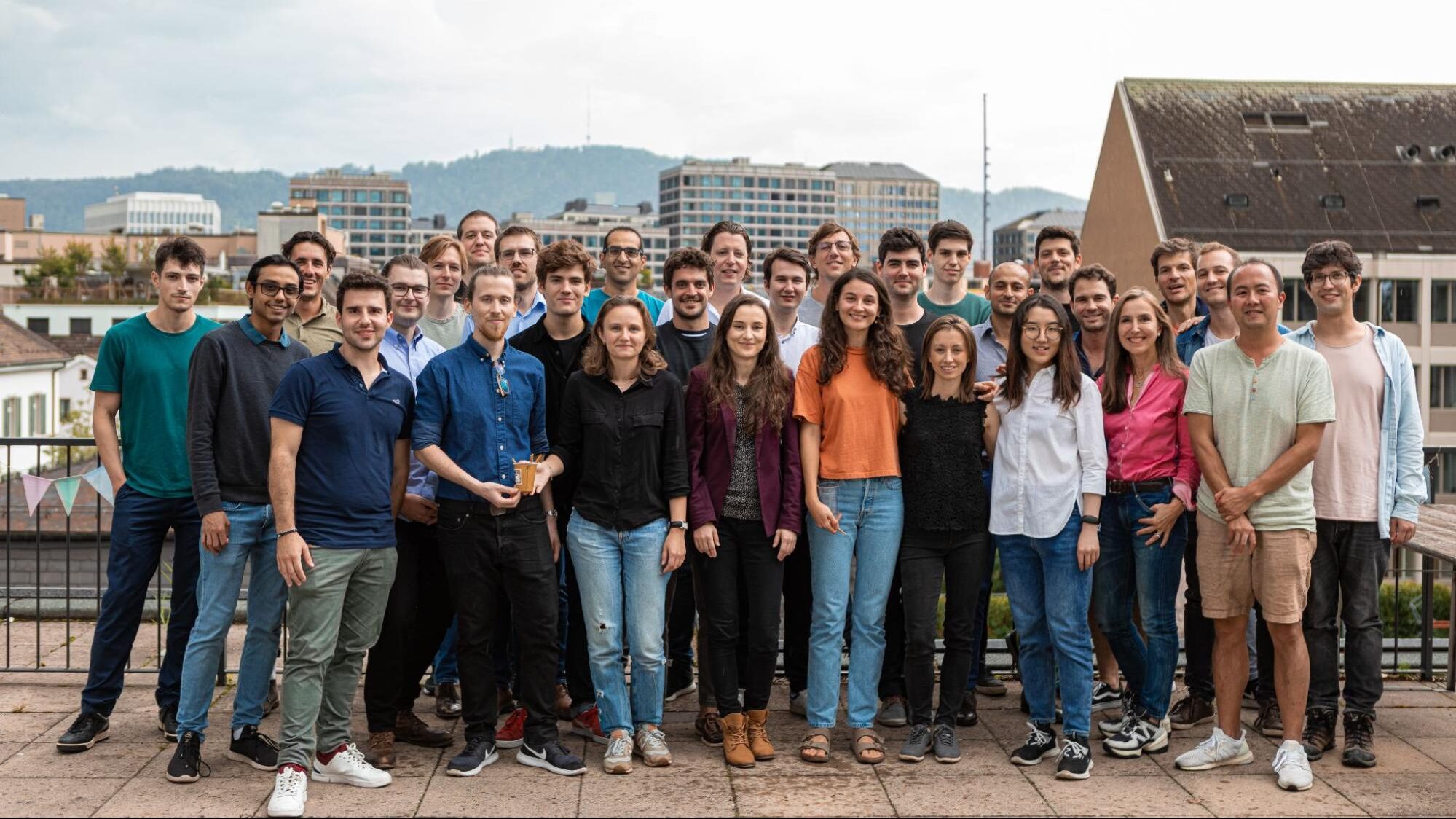The last-mile delivery of heavy goods is often a painful experience for customers. They have to sit at home without knowing when exactly the goods will arrive. The French startup Trusk makes deliveries faster and more transparent and has won over important clients like Ikea. In 2019, Trusk expanded into Switzerland. The co-founders Thomas Effantin, Jonathan Asquier and Sébastien Tronel explain how they achieved strong growth with a deceptively simple idea.
The three founders of Trusk don’t have a background in logistics. Why did you start the company Trusk?
Not being from the industry allowed us to have a consumer-centric view from the start, and this is what sets Trusk apart from traditional non-digital transport companies. We found the idea for Trusk by iteration. At first, we had a company that allowed clients to store their belongings in boxes we brought to them and then delivered to storage sites. These clients started to ask us if we could also move heavy items from one place to another. We quickly realize that this could become even bigger than the storage business, because in transport, a service culture is lacking, everything is complicated and takes a lot of time.
How did the three of you meet?
Sebastien and I went to the same school and our parents know each other. We lost touch when I was working in Dubai but reconnected when I came back. We were introduced to our CTO co-founder Jonathan at the accelerator “The Family” in Paris. We’re a well-matching trio with complementary skills.
Trusk today works with large retailers, who offer the service to their customers. Why did you choose this approach?
We did the first test run with the French retailer “Le Bon Coin” and immediately had very strong traction. At the time, we still managed the deliveries by phone and with Excel! When we approached Leroy Merlin and Ikea, we saw that they had the same issue. The transporters they were working with didn’t correspond to what clients expected. And we didn’t just bring them a solution for their problem with our on-demand trucks, we offered them a high-quality service.
How can you assure this quality even with the strong growth of Trusk?
Our Truskers, as we call them, are all professional transporters, which in France is a regulated domain, and own their trucks. Before they make their first delivery for us, they go through the Trusk Academy, a series of training and qualifications with an exam at the end. We really want to make sure their client relations are top-notch. If they pass the exam, they do a one-month trial phase. Only if the customers were happy can they become real Truskers.
What is the working model of a Trusker?
Once they’ve received their uniform and we covered their vehicle with the Trusk logo, they have access to the app where they see all the deliveries and can choose which ones to make. The app calculates the price the retailer has to pay to the Truskers, and we take a commission of 25%. The retailers are free to choose how much they bill the end-client. Most of the Truskers work for Trusk a few days per week and for their own clients on other days, it is a very flexible model for them. But their service quality alway has to be irreproachable. If it isn’t and they make several errors, we’ll stop working with them.
Is it correct to call Trusk a sort of “Uber for delivery of heavy goods”?
It helps to understand what we do, but we’re much closer to our Truskers than Uber is to their drivers. This is possible because we don’t need millions of drivers. In France, we have the same status as multinationals like FedEx, which means that we’re ultimately responsible for the delivery of the goods.
How do you plan to grow your business?
We’re consolidating our position as the market leader in France, where we’ll add one or two cities to the 9 we’re already active in. We’re only active in big cities with a large potential for deliveries. Switzerland is the first market in our expansion roadmap. We’ve started to work with Ikea Geneva six months ago. This is the way we want to grow, by starting in a new city with a big client that gives us a lot of business. We don’t burn money that way and can establish a good crew of Truskers so that we’re then capable of onboarding large new clients. We’re on the verge of opening Zurich as a new city with its two Ikea stores. And we’re in discussions with several large retailers in Switzerland to which we were introduced by investiere’s network.

Invest in Startups
As one of Europe’s most active venture capital investors, we grant qualified private investors access to top-tier European startups. With investments starting at EUR/CHF 10’000, you can build your own tailored portfolio over time and diversify across stages and sectors.
What comes next after Switzerland?
Germany. We’re in discussion with Ikea in Germany and there is a chance that we can start there with several of the 55 Ikeas, which would be an incredible opportunity. Winning Ikea as a customer in a new city is like building a fortress. It gives us a position that is almost unassailable for competitors.
“For the time being, we’re killing the competition.”
Speaking of which, how is competition holding up?
For the time being, we’re killing the competition. Trusk was first to approach big retailers, which allowed us to develop very fast. With this traction, we’re able to raise money from venture capitalists. Small competitors that work with private clients directly struggle to scale and raise money. We’re busy improving our technology, improve even further the experience for users and drivers, and optimize distribution and planning of the delivery routes and the capacity needed for a given time. When we have the right capacity available it usually takes just 10 to 20 seconds for a given delivery to be accepted by a Trusker.
What is your long-term vision for Trusk?
Three and a half years ago we still handled deliveries on the phone. Now we automatically handle tens of thousand deliveries per month. In a few years, we want to become the European market leader and be present in all important cities, by reapplying our expansion playbook from Switzerland and Germany to the other European countries.
What makes you so confident that many retailers will want to work with a startup?
Because by partnering with us they can stay in the game where Amazon has redefined the rules. Delivery isn’t an afterthought anymore, it is the moment that you shake hands with your customer. Retailers that don’t improve their logistics and still make their customers sit at home a whole day without the slightest idea when a delivery will arrive will eventually go out of business. And if a company with 40 billion revenue like Ikea wants to work with Trusk, why shouldn’t other companies do it?
Written by
WITH US, YOU CANCO-INVEST IN DEEP TECH STARTUPS

Verve's investor network
With annual investments of EUR 60-70 mio, we belong to the top 10% most active startup investors in Europe. We therefore get you into competitive financing rounds alongside other world-class venture capital funds.
We empower you to build your individual portfolio.
More News
19.10.2021
Seervision raises
CHF 3.7 Mio.
to accelerate
market expansion
ETH spin-off Seervision successfully completed a financing round earlier this year led by Verve Ventures, along with Athens-based VC Metavallon, the EIC Fund, Zürcher Kantonalbank and existing investors.
03.09.2021
“The market came back very strongly”
Covid-19 almost brought the MedTech M&A market to a halt. But now, there is a lot of activity, and the prices that are paid for companies are high. How long will this last? In our interview, M&A expert Alexander Wenzel gives his perspective on what drives the market.
13.11.2020
The market for ecoRobotix’s weeder
In this interview, we speak with Sébastien Thibaud, an expert in agricultural machinery, about the market potential of ecoRobotix’s weeding technology.
Startups,Innovation andVenture Capital
Sign up to receive our weekly newsletter and learn about investing in technologies that are changing the world.




